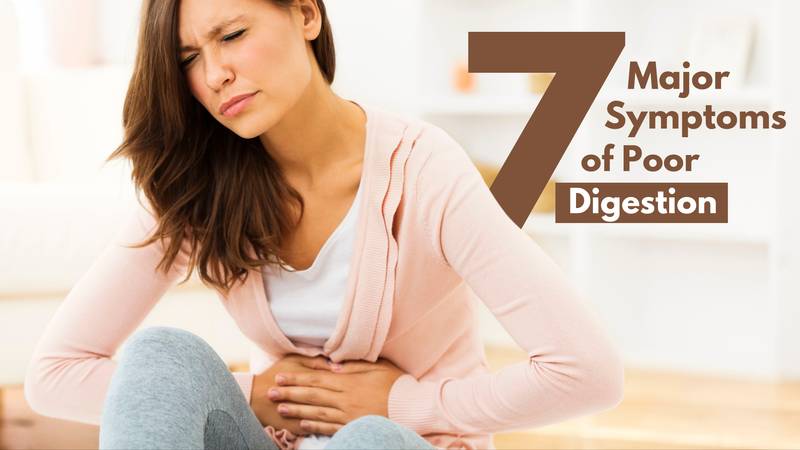7 Signs of Poor Digestive Health and How to Fix Them
Digestive health is like the foundation of a house—if it's shaky, the rest of your body can struggle to function properly. Poor digestion can lead to discomfort, nutrient deficiencies, and a host of other health issues. Let’s uncover seven signs that your digestive system might need some attention and explore how to get things back on track.
1. Frequent Bloating
Bloating feels like your stomach has turned into a balloon, often leaving you uncomfortable or in pain. This can happen when your digestive system struggles to process food properly, causing gas to build up.
How to Fix It:
- Eat Mindfully: Slow down and chew your food thoroughly.
- Avoid Trigger Foods: Cut back on carbonated drinks, beans, and cruciferous vegetables if they cause issues.
- Try Probiotics: These healthy bacteria can help balance your gut and reduce bloating.
2. Persistent Heartburn
Heartburn, or acid reflux, feels like a burning sensation in your chest or throat, often after eating. It’s a sign that stomach acid is escaping into your esophagus.
How to Fix It:
- Eat Smaller Meals: Overeating can worsen heartburn.
- Avoid Trigger Foods: Spicy, fatty, or acidic foods often cause flare-ups.
- Stay Upright After Eating: Give your stomach time to digest properly before lying down.
3. Constipation
Constipation occurs when you have fewer than three bowel movements a week or find it difficult to pass stool. It’s often a result of insufficient fiber, water, or physical activity.
How to Fix It:
- Increase Fiber Intake: Add more fruits, vegetables, and whole grains to your diet.
- Stay Hydrated: Drink plenty of water throughout the day.
- Exercise Regularly: Movement helps stimulate digestion.
4. Diarrhea
Diarrhea, or frequent loose stools, can dehydrate your body and upset the balance of electrolytes. It’s often caused by infections, food intolerances, or stress.
How to Fix It:
- Stay Hydrated: Drink water with electrolytes to replenish lost fluids.
- Eat a BRAT Diet: Bananas, rice, applesauce, and toast are gentle on your stomach.
- Avoid Dairy: If lactose intolerance is the issue, skip dairy products temporarily.
5. Excessive Gas
While gas is a natural part of digestion, excessive or foul-smelling gas can indicate an imbalance in gut bacteria or difficulty digesting certain foods.
How to Fix It:
- Keep a Food Diary: Track what you eat to identify triggers.
- Consider Enzyme Supplements: Lactase or other enzymes can help break down troublesome foods.
- Incorporate Fermented Foods: Yogurt, kimchi, or sauerkraut can support gut health.
6. Stomach Pain or Cramps
Recurrent stomach aches or cramps might be linked to digestive disorders like irritable bowel syndrome (IBS) or food intolerances.
How to Fix It:
- Avoid Trigger Foods: Common culprits include dairy, gluten, and high-fat foods.
- Manage Stress: Practice relaxation techniques like yoga or meditation.
- Consult a Doctor: If the pain is severe or persistent, seek professional advice.
7. Fatigue After Eating
Feeling unusually tired after meals may signal poor digestion or nutrient absorption issues.
How to Fix It:
- Balance Your Meals: Include a mix of protein, healthy fats, and complex carbohydrates.
- Limit Processed Foods: Opt for whole, nutrient-dense options instead.
- Check for Deficiencies: Iron or vitamin B12 deficiencies can also contribute to fatigue.
General Tips for Better Digestive Health
- Eat Prebiotic Foods: Garlic, onions, and bananas feed good gut bacteria.
- Stay Active: Regular exercise keeps your digestive system moving.
- Limit Stress: Chronic stress can disrupt digestion, so practice mindfulness or relaxation techniques.
- Get Enough Sleep: Rest supports your body’s natural healing processes.
Your digestive system plays a vital role in your overall well-being. By addressing these common signs of poor digestive health and making small, consistent changes, you can help your body feel its best every day. If symptoms persist, consult a healthcare professional for personalized guidance.


